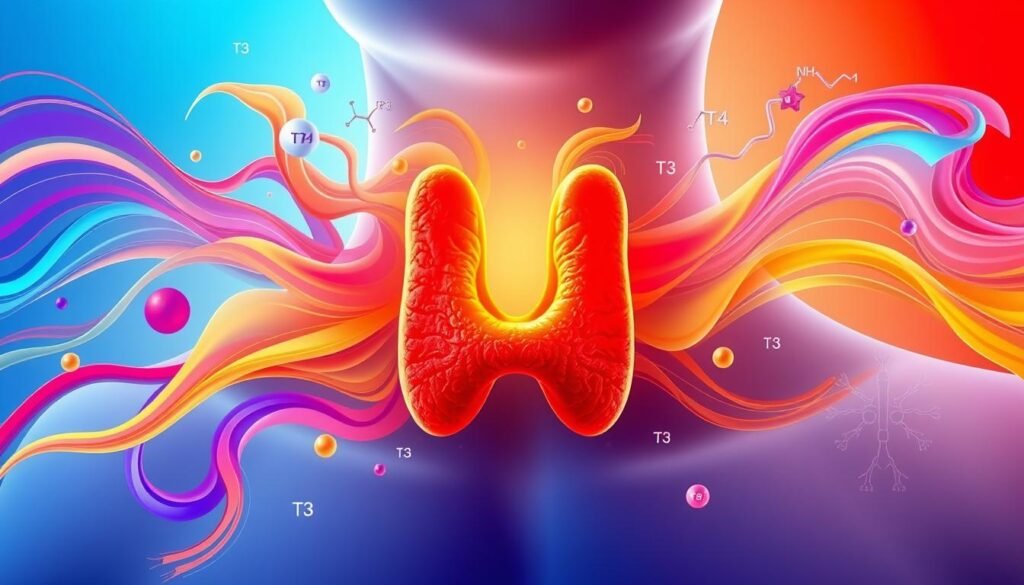Did you know more than 50 hormones help our bodies work right? But every year, millions of people face hormonal imbalances. These issues can cause mood swings, weight changes, and problems with having babies. Understanding these changes is vital. It helps us recognize the problems and find good solutions. Hormones are our body’s messengers. They play a big part in our growth, feelings, and health. As our life changes, so do our hormones. Knowing the signs means we can get the right help and treatments. In this article, we’ll explore what causes these changes and how to handle them.
Key Takeaways
- Hormonal changes significantly impact both physical and emotional well-being.
- Over 50 hormones in the body regulate various functions, including mood and metabolism.
- Common signs of hormonal imbalance include unexplained weight changes, fatigue, and irregular periods.
- Managing stress and maintaining a balanced diet are key solutions for hormonal changes.
- Hormonal imbalances can lead to reproductive issues and impact mental health.
What are Hormonal Changes?
Hormonal changes are when the levels of hormones in your body go up or down. These hormones come from the endocrine system. This complex system has glands that send hormones straight into your blood. Hormones control many things in your body, like how you grow, sleep, and feel.
These changes can happen naturally or because of other things. For example, puberty, pregnancy, and menopause are times when they occur. Stress and some health issues can also cause a hormonal imbalance. It’s important to know when these changes happen. They can tell us a lot about our health.
If your hormones are out of balance, you might feel really tired or have sudden mood changes. You might also have trouble with your weight or with having a baby. Getting older, your lifestyle, and health problems like thyroid disease can cause these problems.
Signs of Hormonal Changes in the Body
Hormonal shifts can deeply affect your body and mind. Spotting the signs of hormonal changes early is key. Look out for changes like:
- Unexplained weight gain or loss
- Fatigue and low energy levels
- Mood swings and irritability
- Irregular menstrual cycles in those assigned female at birth (AFAB)
- Hot flashes and night sweats
- Reduced libido and sexual dysfunction
- Digestive issues, such as constipation
- Skin conditions like adult acne and dryness
- Headaches associated with menstrual cycles or hormonal shifts
The effects of hormonal shift symptoms depend on the person and the change. Stress and lifestyle can make symptoms worse. Conditions like PCOS bring their own set of challenges, like irregular periods and more hair growth. This highlights why knowing the symptoms of hormonal imbalance matters.
It’s crucial to seek medical help if you notice big changes. Doctors use tests to find hormone imbalances. Blood tests can show hormone levels changing. Imaging tests, such as ultrasounds, check your reproductive organs. Finding and treating problems early can ease symptoms, improving your health and happiness.
For more details on these symptoms and what they mean, take a look at the sources offering more information about hormonal changes.
| Symptom | Description |
|---|---|
| Weight Changes | Unexplained gain or loss potentially linked to hormonal fluctuations. |
| Fatigue | Persistent tiredness not aligned with activity levels. |
| Mood Swings | Frequent changes in emotional state, irritability. |
| Sleep Disturbances | Insomnia, poor quality sleep, linked to hormonal levels. |
| Skin Issues | Adult acne, dryness, or other skin changes attributed to hormonal imbalances. |
How Hormonal Changes Affect Men and Women
Hormonal changes affect men and women’s emotions and how they interact with others. Each gender experiences different hormone level changes. These changes influence their behavior and how they relate with people around them.
For women, estradiol and progesterone shifts are key, especially during their menstrual cycle. A rise in estradiol can make women view their partners less positively. This shapes their thoughts on their relationships. High estradiol levels can make both partners feel negatively about their relationship.
Increased progesterone after ovulation often leads to more favorable views of partners. Men’s testosterone levels can affect women, creating a cycle of influence. If both genders have higher testosterone, they might feel more jealous.
These hormonal changes make women dress boldly and act more openly around ovulation. Men might become more loving or protective. This could be because they want to prevent competition.
Understanding how women’s hormonal changes affect relationships is important. It helps us see things clearer. Likewise, knowing how men’s hormones change can improve our relationships.
Common Causes of Hormonal Changes
Hormonal changes can stem from various causes of hormonal changes that impact both men and women. Over 50 different hormones play a vital role in our bodies. These changes can result from stages like puberty, pregnancy, and menopause.
Other factors include chronic conditions like PCOS and thyroid disorders. Diseases such as Cushing’s syndrome also play a part. Environmental elements and lifestyle choices can also disrupt hormone balance. This includes exposure to harmful chemicals, poor diet, and high stress levels.
Some medicines, especially hormonal therapies, might change hormone levels too.
The table below showcases some prevalent endocrine disorders and how they relate to hormonal changes:
| Endocrine Disorder | Possible Causes | Symptoms |
|---|---|---|
| Hypothyroidism | Autoimmune conditions, iodine deficiency, pituitary disorders | Fatigue, weight gain, depression |
| Cushing’s Syndrome | Excess cortisol production, tumors | Weight gain, high blood pressure, mood changes |
| Polycystic Ovary Syndrome (PCOS) | Genetics, insulin resistance, hormonal imbalance | Irregular periods, weight gain, acne |
It’s important to know the causes of hormonal changes to get the right help. Regular check-ups are vital, especially if symptoms linger for weeks. This can help find effective treatments based on specific needs.

Hormonal Changes During Puberty
Puberty is a crucial time in life, filled with puberty hormonal changes. These changes lead to both physical and emotional transformations. For those identified as female at birth, it starts between 8 and 13 years. The first sign is often breast bud development, leading to more puberty symptoms of maturing.
For individuals identified as male at birth, puberty starts between 9 and 14 years. They see a rise in testosterone. This leads to muscle growth, more body hair, and a deeper voice.
Emotionally, puberty is a rollercoaster. Teens may feel confused, anxious, and very emotional. This is because of sex steroids and the limbic system. Together, they make emotions more intense.
Puberty happens at different times for everyone. Boys usually have growth spurts between 12 and 15 years. Girls have theirs before their first menstrual cycle. After menstruation starts, girls grow 1 to 2 inches more.
Adolescence hormonal shifts are not just about growing. They prepare the body for future reproduction. But, these shifts can be tough to handle. Knowing about these changes helps make this stage of life easier to manage.
Menopause: A Significant Life Transition
Menopause is a key stage in a woman’s life, usually happening from 45 to 55 years old. It brings hormonal changes, marking an end to the ability to have children. This happens because the body makes less estrogen and progesterone.
Symptoms like hot flashes, mood swings, and sleep problems can greatly affect a woman’s health and happiness. Not all women experience these changes the same way, though.
The period before menopause is called perimenopause. It can affect a woman’s body and mind for years. During this time, about 75% of women have hot flashes. But for many, these symptoms fade in about two years. Still, some women face menopause early, before 40, due to health issues.
With less estrogen, women might see changes in their bodies that raise heart disease risks. This is key because women have traditionally been less likely to get heart disease than men. Sadly, many women struggle to find the information and support they need during this time.
Many research options like hormone replacement therapy (HRT) for easing menopause symptoms. But it’s vital to weigh its risks and benefits. There are other ways to find relief too, such as non-hormonal treatments, herbal remedies, and changing lifestyle habits.
Understanding the emotional side of menopause is improving. Yet, getting good health care can still be hard for many women. The issue of sexual health during menopause is often overlooked. It’s critical to provide better care as women can live 21 more years after reaching 60.
If you’re looking for natural ways to ease menopause anxiety, there are many effective options. Check them out at managing menopause symptoms.
Understanding Andropause and Its Impact
Andropause is known as the male menopause. It happens when testosterone levels in men drop. This usually affects men who are 50 or older. Such age-related hormonal changes can greatly affect someone’s life quality.
After 30, a man’s testosterone levels fall by 1% every year. By 50, about 30% of men will show signs of andropause. These symptoms include:
- Low energy and fatigue
- Depression and decreased motivation
- Reduced libido
- Erectile dysfunction
- Loss of muscle mass and decreased bone density
- Infertility concerns
To deal with these symptoms, making some lifestyle changes is key. Getting regular exercise, eating well, sleeping enough, and managing stress can help. These actions can ease the troubles caused by testosterone decline.
There are also medical treatments like hormone replacement therapy. But, these can have side effects and risks, especially for men with prostate cancer. It’s vital to get medical advice to improve your health during andropause.

It’s vital for men with age-related hormonal changes to get professional advice. Understanding andropause helps people make smart choices. This can boost their life quality as they get older.
Effects of Hormonal Changes on the Menstrual Cycle
Hormones greatly affect how often and intensely women get their periods. Changes in these hormones can lead to different menstruation symptoms. For example, while some women have cycles that are 28 days long, this isn’t the case for everyone. About 20% of women see their menstrual cycles vary from the 28-day cycle.
Usually, menstrual bleeding lasts from 4 to 8 days. The amount of blood lost can be between 1/5 to 2 1/2 ounces. Changes in hormones during the cycle can cause bloating, cramping, and mood swings. If periods happen less than 24 days apart or more than 38 days apart, they’re considered irregular. This can make menstruation more difficult.
PCOS (Polycystic Ovary Syndrome) is a condition often caused by hormonal imbalances. It can lead to irregular periods. Making healthy lifestyle choices can help regulate hormones. Plus, hormone therapy can be effective in treating hormonal changes.
Knowing your body is crucial. Paying attention to changes in your cycle is important. If you face menstrual irregularities or other issues, talking to a doctor can help manage hormonal imbalances.
| Cycle Length | Days | Typical Symptoms |
|---|---|---|
| Normal Cycle | 24 to 38 days | Regular periods, mild bloating |
| Irregular Cycle | Less than 24 or more than 38 days | Heavy bleeding, severe cramping, mood swings |
| Post-Ovulation | Approximately 14 days | Possible PMS symptoms before menstruation |
Thyroid Disorders and Hormonal Changes
The thyroid gland is key in controlling our metabolism by producing hormones like thyroxine (T4). Problems with the thyroid can lead to big hormonal shifts. These are seen in conditions like hypothyroidism and hyperthyroidism.
About 1 in 20 Americans over 12 have hypothyroidism, or an underactive thyroid. They may feel tired, gain weight, and have menstrual issues. This condition can also increase the risk of ovarian cysts and impact ovulation. Plus, it often leads to feeling depressed and having trouble thinking clearly.
Hyperthyroidism means the thyroid is too active. It affects around 1 in 100 people. This can cause anxiety, weight loss, and even osteoporosis. In women, it can create serious problems during pregnancy. This includes high blood pressure and heart failure, risking the health of both the mother and baby.
Thyroid problems are more common in women than men. Women are 5 to 8 times more likely to have thyroid issues. By the time they are adults, 1 in 8 women will face a thyroid disorder. These issues can lead to puberty happening too early or late, irregular menstrual periods, and early menopause.

| Condition | Hormonal Effects | Demographic Impact |
|---|---|---|
| Hypothyroidism | Weight gain, fatigue, irregular periods | Affects 1 in 20 Americans over 12 |
| Hyperthyroidism | Anxiety, weight loss, osteoporosis | Affects 1 in 100 individuals |
| General Thyroid Disorders | Emotional challenges, menstrual irregularities | Women 5-8 times more likely to be affected |
It’s important to address thyroid disorders to keep hormones balanced. Not managing these conditions can cause serious health and emotional issues. We must recognize and treat thyroid problems quickly.
Solutions for Managing Hormonal Changes
Managing hormonal changes means considering what each person needs. It could include hormonal therapies like hormone replacement. Other things, like adjusting your lifestyle, are key to balance hormones.
Eating 25–30 grams of protein with every meal is a smart move. This diet, combined with exercise, can make hormone receptors work better. It manages insulin levels, helping those who struggle with it. Understanding the role of weight and hormones in insulin sensitivity is vital.
Improving gut health is crucial for hormone balance. It impacts how you process insulin and feel full. Cutting down on sugar is also important. It keeps hormones in check and fights obesity and diabetes.
Stress can lead to weight gain by raising cortisol levels. So, managing stress with techniques like mindfulness helps balance hormones.
Sleep is crucial for hormone health. You should get at least 7 hours each night. Doing things that improve sleep, like exercising, can also boost mood and reduce stress.
There are other natural ways to maintain hormone balance. Include high-quality fats, like omega-3s, to lessen insulin resistance. Eating enough fiber boosts insulin sensitivity and helps you feel full. A Mediterranean diet can also help lower estrogen levels and cut cancer risk.
If you’re having hormonal issues, see a healthcare provider. They might suggest tests like blood work or ultrasounds to find the problem. Experts stress that dealing with hormonal issues early can improve your health. For more details, check this resource.
Conclusion
Understanding how hormones change is key to seeing their big impact on health and happiness. This summary shows how these shifts affect us at different times in our lives, like puberty, pregnancy, and menopause. It’s important to know about hormonal balance, because when it’s off, it can cause many problems, such as mood swings and health issues.
Handling hormonal changes well means combining lifestyle changes, medical treatment, and diet. By checking hormone levels with blood tests and talking to doctors, people can make smart choices for their health. Eating well and exercising can help lessen the problems caused by hormonal changes, making life better during these tough times.
Getting advice from doctors is crucial for dealing with hormonal issues in a way that’s best for each person. By being aware and taking action early, people can improve their well-being and fight the negative effects of hormone shifts.